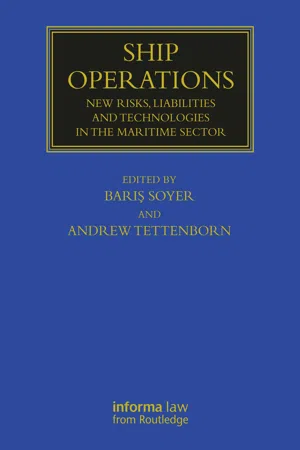
Ship Operations
New Risks, Liabilities and Technologies in the Maritime Sector
- 240 pages
- English
- ePUB (mobile friendly)
- Available on iOS & Android
Ship Operations
New Risks, Liabilities and Technologies in the Maritime Sector
About this book
This book covers in one handy volume all the major topics associated with ship operations. Carefully, co-ordinated to ensure breadth, relevance and lack of overlap, the topics covered are addressed by authors are the very top of their profession, whether in legal practice or academia, and are presented in a manner which is topical and clear.
Part I offers a detailed and critical analysis of issues of contemporary importance concerning new liability regimes and developments. Part 2 discusses how parties, in particular ship operators, attempt in contemporary practice to allocate their risks concerning ship operations. Part 3 evaluates the legal position of those involved in more 'back office' operations.
The book provides an invaluable guide to recent legal and practical developments and offers a comprehensive, well-informed and thoroughly practical guide on what is a very complex and developing area of law. It will therefore be of great use to legal practitioners and administrators of ship operations worldwide, as well as students in this area and academics associated with maritime law generally.
Frequently asked questions
- Essential is ideal for learners and professionals who enjoy exploring a wide range of subjects. Access the Essential Library with 800,000+ trusted titles and best-sellers across business, personal growth, and the humanities. Includes unlimited reading time and Standard Read Aloud voice.
- Complete: Perfect for advanced learners and researchers needing full, unrestricted access. Unlock 1.4M+ books across hundreds of subjects, including academic and specialized titles. The Complete Plan also includes advanced features like Premium Read Aloud and Research Assistant.
Please note we cannot support devices running on iOS 13 and Android 7 or earlier. Learn more about using the app.
Information
PART I
NEW RISKS AND LIABILITIES AFFECTING SHIP OPERATIONS
CHAPTER 1
The role of insurance in sanctions regimes
1 Insurance sanctions
1.1 Comprehensive sanctions
[T]he civilian suffering caused by such measures often overshadow their potential political gains; moreover, comprehensive sanctions complicate the work of humanitarian agencies, cause long-term damage to the productive capacity of target nations, and unfairly penalize their neighbors (who are often their major trading partners).4
1.2 Targeted financial sanctions
[T]he sanctions were applied erratically in most instances: first to the leaders only, then to their families, and still later to the elite supporters of the regime. By the time all the targets were publicly identified, they had ample time to move and protect their financial assets.9
Firstly, financial sanctions target only the rogue-party’s assets, or the assets of a given organization whose policies are inconsistent with international norms. Secondly, financial sanctions are, in theory, easier to enforce than traditional trade sanctions, which call for blockades, massive enforcement costs, monitoring costs, etc. In addition, sanctions aimed at delaying/denying credit, or monetary grants to targets are theoretically much easier to monitor.16
1.3 How successful are targeted financial sanctions?
Table of contents
- Cover
- Half Title
- Series Page
- Title Page
- Copyright Page
- Table of Contents
- List of contributors
- Foreword
- Preface
- Table of cases
- Table of legislation
- Part I New Risks and Liabilities Affecting Ship Operations
- Part II Contractual Arrangements to Deal with Operational Issues Emerging
- Index